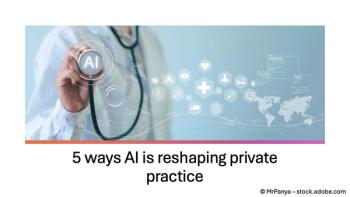
Market Place: Who’s Got Your Back?
With most tech-savvy practices now equipped with EMRs, the market must learn to appeal to smaller practices. But is it even worth the trouble?
EMR vendors face a problem. By now, most sophisticated small practices and tech-happy huge practices already have an EMR. Future sales depend on small, not-so-urbane, “mom and pop” practices.
Yet no vendor can afford to send support teams into every solo or two-physician clinic. “It’s not economical for vendors to spend a week at a one-doc practice in an obscure part of Wyoming,” says Bruce Kleaveland, a former EMR company CEO who is now a technology consultant in Seattle and coauthor of our “Tech Doctor” column.
Besides, says healthcare IT consultant Robert Dichter, many smaller, bootstrap practices wouldn’t pay for support and training services, even if EMR companies were able to back them.
In other industries, technology companies rely on third parties to provide service when growth reaches a certain level. That’s harder when it comes to EMRs because the primary user is a swamped physician and “the software itself is more intimate to the user. You need to be a lot more hands-on,” says John Nebergall, senior vice president of client support for Allscripts.
It’s not easy to find third-party vendors qualified to step in with this level of support. Allscripts has only a handful of service partners, and Nebergall says it took years to find the right ones.
The support gap is a problem. Even though EMRs are long past the early-adoption phase, they are not really “plug-and-play” software systems. You might be able to figure out on your own how to perform basic functions, but you’ll get a lot more out of an EMR if you take advantage of its more advanced features. An EMR offers a chance to rework processes - not just digitize your current inefficient work flow. But when you’ve done something a particular way for years, it’s hard to imagine any other. That’s one reason outside assistance can be so valuable.
Here’s another: Even the best EMR will bring some technical headaches not necessarily related to the software itself. Adding new users, tying in new printers, upgrading management software, or simply updating virus protection software can bog down an EMR, says Nebergall.
That’s just the sort of thing that a large practice with IT staff might be able to solve, but a smaller practice relying on a friend of a friend who is a bit geeky will be out of luck. Forces are rallying to fill the breach. The founder of Praxis EMR has started a separate company, Vt-Med, to supply 24-hour support to any clinic regardless of the software it uses. Paconic IPA, which supports some 2,300 physicians near Poughkeepsie, N.Y., has started MedAllies, which provides end-to-end service to everyone who buys NextGen through the IPA.
Meanwhile, vendors are working hard to provide support without having to send bodies out to each practice. For example, Allscripts installed a software monitoring program across its entire client base. The system can remotely spot problems (such as an overwhelmed memory) that might affect an EMR’s performance.
I still think an EMR is more than worth the investment. But if you’re in a smaller practice, you should be pragmatic about the nature and amount of assistance you’ll need.
Consider carefully how you’ll get your implementation and support work done. It’s unlikely you’ll be able to do it well by yourself.
Pamela Moore, PhD, is senior editor, practice management, for Physicians Practice. She has been writing for physicians on practice management topics for eight years, and she is a recognized speaker and commentator on healthcare management. You can respond to her column at
This article originally appeared in the February 2007 issue of Physicians Practice.
Newsletter
Optimize your practice with the Physicians Practice newsletter, offering management pearls, leadership tips, and business strategies tailored for practice administrators and physicians of any specialty.






